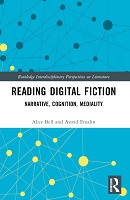Reading Digital Fiction
Proposal review
Narrative, Cognition, Mediality
Author(s)
Bell, Alice
Ensslin, Astrid
Collection
UK Research and InnovationLanguage
EnglishAbstract
Reading Digital Fiction offers the first comprehensive and systematic theoretical, methodological, and analytical examination of digital fiction from a cognitive and empirical perspective. Proposing the new concept of “medial reading”, it argues for the centrality of an audience’s interest in, awareness of and/or attention to the medium in which a text is produced and received, and which we argue should be applied to reader data across media. The book analyses and theorises five generations of digital fiction and their reading including hypertext fiction, hypermedia fiction, narrative video games, app fiction, and virtual reality. It showcases medium- and platform-specific methods of qualitative reader response research across a variety of contexts and settings from screen-based and embodied interaction to gallery installation, and from reading group and individual interview to think-aloud methodologies. The book thus addresses the unique affordances of digital fiction reading by designing and reporting on new empirical studies focusing on hypertextuality, interactivity, immersion, as well as medium-specific forms of textual “you”, ontological ambiguity, reader orientation and empathy. In so doing, the book refines, critiques, and expands cognitive, transmedial, and empirical narratology and stylistics by placing the reader of these new narratives front and centre.
Keywords
Digital Fiction;Electronic Literature;Stylistics;Narratology;Reader response;Empirical;Cognitive;Qualitative;TransmedialDOI
10.4324/9781003110194ISBN
9781040010501, 9781003110194, 9780367626709, 9781040010471Publisher
Taylor & FrancisPublisher website
https://taylorandfrancis.com/Publication date and place
2024Grantor
Imprint
RoutledgeSeries
Routledge Interdisciplinary Perspectives on Literature,Classification
History
Cultural studies
Linguistics
Literary studies: c 1900 to c 2000
Literary theory


 Download
Download